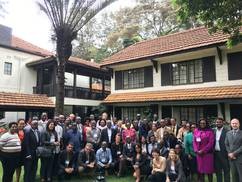
GCED Basic Search Form
Quick Search
You are here
News

In the framework of the 2030 Education Agenda, the UNESCO Regional Office for Eastern Africa, with the support of the Government of Japan, organized a regional technical workshop under the umbrella of education for sustainable development and global citizenship education to support member states unpacking the Sustainable Development Goal SDG 4.7 in their national policies and practices.
The workshop gathered over 80 participants’ representatives from ten countries under the UNESCO Regional Office for Eastern Africa (Comoros, Djibouti, Kenya, Madagascar, Mauritius, Seychelles, Somalia, South Sudan, Tanzania and Uganda) as well as partners, such as IOM, UNFPA, UNICEF, UNEP, UNHCR, UNWOMEN, WFP, Arigatou International, Aga Khan Foundation, Interpeace, JICA, Teachers Against Violent Extremism and the Southern African Development Community (SADC).
The workshop was opened with very strong and timely messages. Dr. Evangeline Njoka, representing the Cabinet Secretary- Ministry of Education-Kenya, opened the workshop emphasizing that ´countries must make deliberate efforts to ensure that ESD and GCED are enshrined in the education systems and always strive to nurture a culture of peace and tolerance in our children and youth´. The representative of the Japanese Ambassador in Kenya also emphasized the importance of ESD which ´provides competencies and opportunities to contribute to the prosperity of nations while at the same time creating a global community of environment sensitive individuals and communities´.
Talking about the 2030 Education Agenda, Ann-Therese Ndong-Jatta, the Director of the UNESCO Regional Office for Eastern Africa, insisted on the need to re-orient our systems and ensure that communities not only learn to be or to do, but also learn to live together and therefore to move from a “transmission” model of teaching to a “transformative” model of teaching and learning.
The Regional Director of UNEP underlined that ´it is through education that we can strengthen peace and value transmission as fundamentals of human relationships´. The importance of inclusion was also highlighted through the representative of the UNHCR Regional Director who reiterated how much the issue of refugees is at the heart of the 2030 Education Agenda in Africa and also worldwide in order to leave no one behind.
The workshop was an opportunity to clarify frameworks and concepts of ESD and GCED, as well as the monitoring of the SDG 4 Target 4.7. Subsequently, the following four thematic areas outlined further concepts and good practices from countries and key partners: 1) Promoting peace education/prevention of violent extremism through education (PVE-E), 2) ESD and the Global Action Programme (GAP), 3) Empowering learners through health education for sustainable lifestyles, and 4) Defining and addressing GCED through inclusion (including gender equality) and cultural diversity. An extensive session on harmonization of curriculum and integration of approaches, such as ESD and GCED and related areas, was also held with including concrete illustrations of curriculum integration and teachers training. The workshop was key to reiterate critical perspectives within the 2030 Education Agenda such as the role of teachers as the main decision makers and students as the main protagonists of education reforms and systems.
Participants agreed on key regional recommendations to address peace education and PVE, ESD, GCED, Health Education and other related issues such as inclusion and gender equality. Country teams also discussed translating the SDG 4.7 in their national education strategic plans, more specifically the integration in policy, curriculum, teachers training and student’s assessment. They presented their priorities and action plans at the end of the workshop.
The main result of the workshop was also the agreement to establish a community of practice/online platform to implement these recommendations with a focus on knowledge sharing, resource materials dissemination, capacity development and partnerships including, among others, civil society organizations, African economic communities, higher education institutions, UNESCO institutes, sister UN agencies and other partners. This community of practice will be critical to bridge gaps and ensuring key players in ESD And GCED are brought together to build synergy.
Read the presentation of the workshop and the related documents by clicking here
